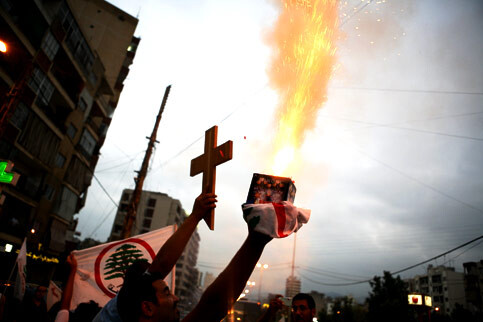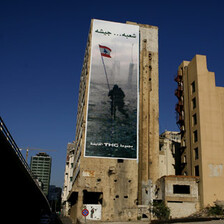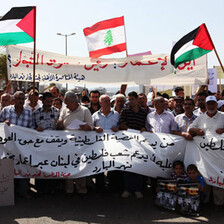Electronic Lebanon 6 November 2007

Lebanese supporters of the Phalange party take to the streets to cheer on their party in an August election to replace assassinated cabinet member Pierre Gemayel. (Matthew Cassel)
As the constitutional deadline of 24 November to elect a president looms large over Lebanon, the presidential race and the marathon rounds of meetings of political actors remained the overarching concern and topic of discussion in the Lebanese press (despite disturbing revelations about Nahr al-Bared camp mentioned in an article by Khaled Saghiyyeh).
Marathon rounds of discussion may be a good omen in participatory or even representative democracies. But in a country governed by the necessity of consensus and the reality of sectarianism, seemingly endless talk can mean too little to agree on and a diplomatic denial of an impasse. What began as a single initiative by Parliamentary speaker Nabih Berri to come to a consensus with March 14 movement leader Saad Hariri over the presidential file has mushroomed into several initiatives and multiple lines of communications in Lebanon and in world and Arab capitals. Top among these were the domestic rounds of negotiations among Christian leaders sponsored by the Maronite Patriarch Nasrallah Sfeir which came to naught, and more recently one-on-one negotiations between Free Patriotic Movement leader and presidential aspirant Michel Aoun and Future Movement leader Saad Hariri in Paris this past week. Meanwhile US, French, Syrian, Saudi and Egyptian delegates scrambled to weigh in on the process with little substance (the latest move was a ministerial meeting in Turkey) and with Washington seemingly unwilling to consider any compromise and failing to publicly back any single candidate (while fully backing the March 14 movement) until the last minute.
The trend of initiatives spawning further initiatives and bilateral meetings superceding roundtable negotiations is perhaps a sign of how confusing and uncertain the situation has become. The presidential file is like a ticking hand grenade that is being tossed from one party to the other in an attempt to absolve oneself of setting it off but without any concerted effort to dismantle it.
So what do the pundits make of all of this? Nicolas Nassif of Al-Akhbar writes about the pivotal role of Aoun’s bid for presidency to the success of any compromise in the context of the Aoun-Hariri meetings. Hiyam Kossayfi of An-Nahar addresses the chances of anther general, current commander of the Lebanese army, Michel Suleiman, of becoming the choice of consensus and the Egyptian and US possible involvement in choosing him. But Suleiman Takkiyyedeen in As-Safir points out in his piece that regardless of the continuous heavy diplomatic movement, this procrastination has dire consequences. He argues that the opposition is well-advised to think of an alternative to chaos if no consensus is reached, with chaos possibly leading to unintended consequences similar to those that transpired during the civil war (such as reinforcing the sectarian system), and playing into the hands of those intent on implementing the American project in the region.
As-Safir, 30 October 2007, Suleiman Takkiyyedeen, “The Option of Containing American Pressure”:
A political compromise may not be possible in the presidential elections battle. The Americans might be of the opinion that the current situation and its balance of power fits into the general regional climate and so they may not wish to ease the tension in Lebanon in isolation of what takes place in the region surrounding it. We could veritably be heading towards more vacuum in our constitutional institutions.The truth is there are no guarantees that things will remain within the limits of a political struggle and the dividing up of power. Such a scenario will be the beginning of descent into chaos. The issue is not merely about honorable intentions and goodwill. In 1975, the national Lebanese movement composed of leftist, nationalist, and secular parties did not carry up arms to impose political reforms and did not foresee the breakout of civil war. The first few military rounds took place between security forces and armed members of the Phalange party on one hand and factions of the Palestinian resistance on the other. The parties of the national movement then [joined the fray] to defend the Palestinian revolution … The main lesson of that experience is that change in Lebanon is impossible amidst community divisions, regardless of the nature of internal balances of power that interact with regional and international interventions and is influenced by them. The experiment of change failed [back then] the moment community divisions materialized and the only way out of the war became a political sectarian compromise, which in turn renewed the collapsing sectarian regime. The war legitimized the seeking of assistance by the sects, particularly the Christians, from the historical enemies of Lebanon. And the compromise [to end the war] brought back coexistence and reconciliation between the groups and lowered the level of reform and harmed the progressive and secular forces and contributed to the latter’s marginalization. A face-off today is not going to be any less dangerous than the experience of the national movement and it will not be possible for the current deep divisions to produce progress in terms of national unity or political reform. This is why there is an urgent need … to contain the possibility of a confrontation. Chaos needs two parties, and the opposition bears a historical responsibility to exert every effort to produce a political compromise and foil the American project, especially when it comes to undermining the accomplishments of the resistance. So is there a plan to contain American pressure other than chaos?
An-Nahar, 3 November 2007, Hiyam Kossayfi, “[General] Suleiman and the case of Fatah al-Islam”:
Aside from the meetings of Aoun [and Hariri], there is political talk centered around general Michel Suleiman who did not announce his candidacy for the presidency but his name is up on the list of the opposition.And since the Nahr al-Bared battle remains central, the Americans are still dealing with the army in admiration of its ability to win a crucial and dangerous battle but without linking this admiration with the presidential file. Information coming in suggests that the Egyptian efforts in Lebanon, which have American backing, is in one way or another linked to nominating Suleiman for the presidency. Information passed around in opposition circles suggests Suleiman received the blessing of Egypt that is in turn trying to convince the Americans to endorse him as well … on the grounds that he represents a middle ground between March 8 and March 14 forces and that the trials that the military was able to overcome makes the general qualified for the presidential post. Albeit there are some among the forces of the majority [March 14] who say that the role the army played in Nahr al-Bared may not bring its commander to [the presidential palace in] Baabda, but will definitely prepare him for some political role in the future.
Al-Akhbar, 2 November 2007, Nicolas Nassif: “The Paris Dialogue: Is it time to declare Aoun president or to have Aoun admit the unfeasibility of his election?”:
Serious results of the meetings between the leader of Change and Reform coalition General Michel Aoun and Future Movement leader MP Saad Hariri in Paris rests on their agreement over a candid response to one question: Is it possible to elect Aoun as president?Both men, more than all others among parliamentary coalitions and leaders, have veto power when it comes to the presidential challenge. Aoun counts on himself being the candidate of choice amongst the opposition and its two strong teams in parliament: Hizballah and Amal, and Hariri counts on his allies’ choice of the two candidates Butrous Harb and Naseeb Lahoud … the Aoun-Hariri meetings have created a third axis of ongoing dialogue carried through two other axes, the initiative launched by parliamentary speaker Nabih Berri and his later meeting with Hariri and that of the Christian Patriarchal initiative. But it is the first time that the Christian camp enters the talks directly, and as such Aoun’s role has become a common feature bridging the efforts of Bkriki (the seat of Christian Maronite religious head Patriarch Sfeir) that are purely Maronite in nature and the Hariri-Berri dialogue, each representing their own sect. And Aoun, in the name of his sect and as its leader, is the candidate most opposed to a compromise that excludes him.
Al-Akhbar, 22 October 2007, Khalid Saghiyyeh, “Scandalous Silence”:
The press and photographic equipment are barred from entering Nahr al-Bared refugee camp one and a half months since the end of fighting. And the public media rounds were nothing more than a staged performance during which participants were not permitted to enter past the camp’s outskirts.Who is afraid of the press? The answer to that question can be found in some of the leaked pictures and the cries of the camp’s returning inhabitants as well as the images that are beginning to circulate on the Internet.
What cannot be hidden anymore is that there is a huge humanitarian crisis in the camp, and that the military operations were accompanied by a vengeful attitude against the camp’s Palestinian residents who left their homes when fighting erupted and had no links to Fatah al-Islam. The press is not the only group that should enter the camp. Official investigative committees should as well. And it is not sufficient to hold the Lebanese army alone, or its undisciplined members, accountable for what happened. The political authority that remained silent bears the ultimate responsibility.
Meet the Lebanese Press is EI’s twice-monthly review of what is making the rounds in the Lebanese press and the pundits’ take on it.
Hicham Safieddine is a Lebanese Canadian journalist.





